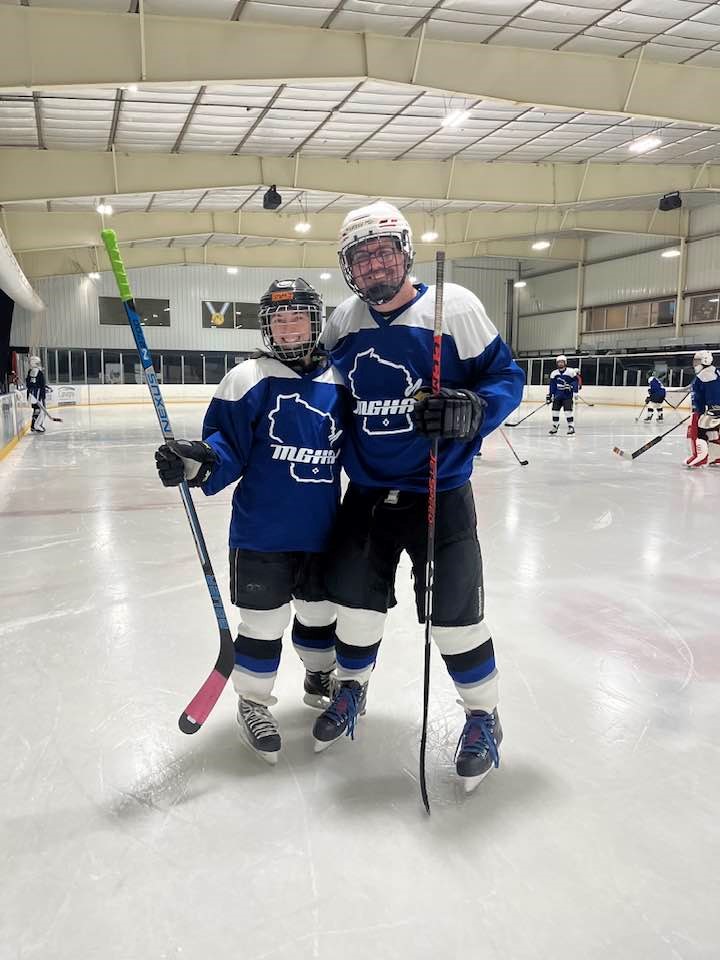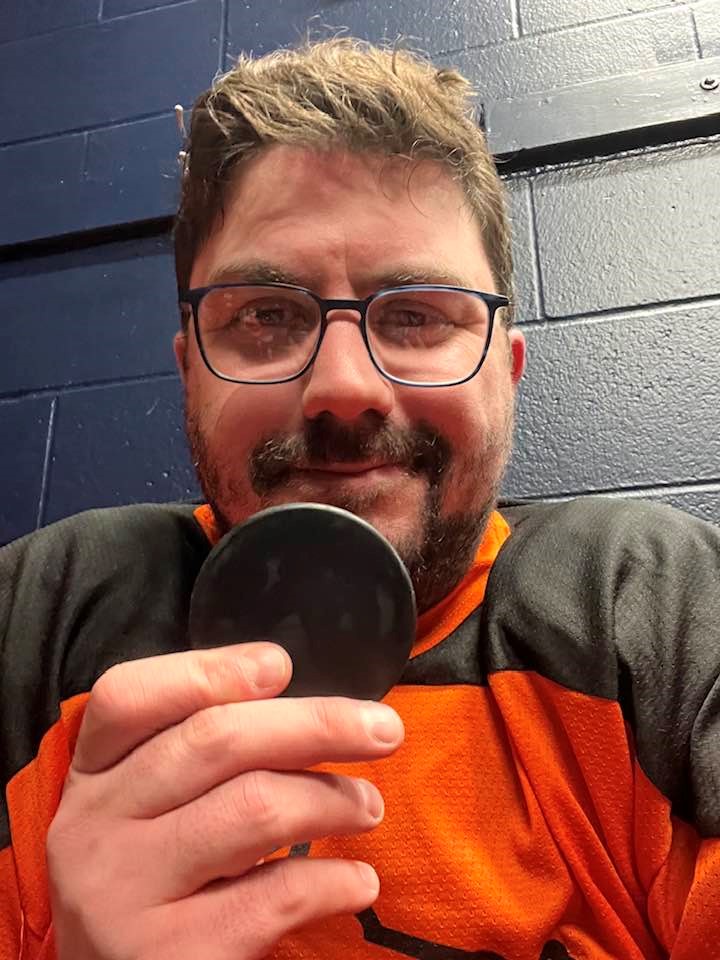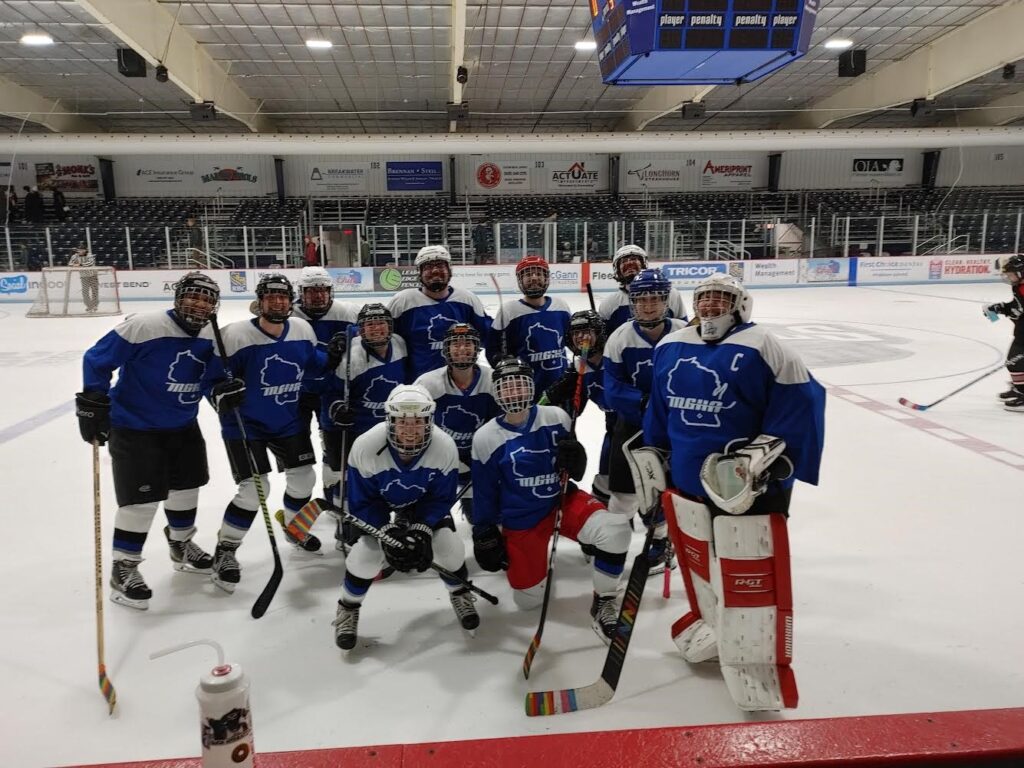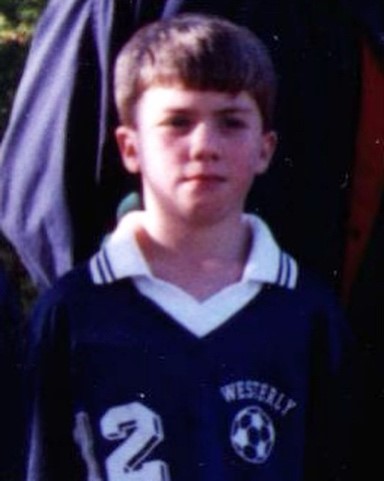Deep breath in.
You’ve got this. All eyes on you. You’ve got this.
Shifting my weight, I looked down at my new cleats, bobbing my head to psych myself up. Navy blue socks covered my shin guards, a soccer ball between my feet.
You’ve got this.
The boy ahead of me launched forward at the sound of the whistle.
You’re up next.
Behind me, I felt the sun on my neck, heating the number 12 emblazoned on my jersey’s back. A light breeze blew across the field, still soggy from melting snow. It was springtime in Rhode Island. I shifted my weight again, moving the ball to the outside of my foot.
The whistle blew.
Let’s do this! Use the outside of your cleat to push the ball out to the left, gather some speed, move the ball back to the right, take aim, and shoot!
I watched the ball leave my laces, racing towards the lower left corner of the goal. The goalie moved, but the ball was just out of reach. Relief flooded my body.
No way! I did it! I actually did it!
I was six years old, playing on my hometown’s boys’ travel soccer team. For the first time, I was on my own; my older sisters were no longer my teammates and protectors. And I’d done it. Here, at our first practice, during the very first drill, with all eyes on me, I’d scored a goal. Try as I might, I couldn’t stifle a grin and the feeling of pride in myself. I turned and started to jog to the back of the line, passing the coach.
“Oh great, we’ve got a Baryshnikov on the team,” he said, rolling his eyes as I went past.
That’s a weird word.
Practice continued with passing drills, throw-in lessons, and footwork training, darting and dodging through a course crafted by cones. With each minute my confidence grew. I might not be so bad at this soccer thing.
“Hey, Twinkle Toes, maybe you should try running like a boy!” I turned around, not sure what was happening, only to see the coach slapping his assistant on the shoulder, doubled over in fits of laughter. I looked to my left, to my right, wondering what was so funny.
“Yeah, you! Run like a boy, Greene!” shouted the coach, mockingly pronouncing the otherwise silent e at the end of my name.
I froze.
They’re talking to you. They’re laughing at you. What did you do wrong?
Time crawled as the other boys turned in slow motion, looking at me and laughing. Sure, some likely didn’t know why they were laughing, just that everybody else was, so they should, too.
“Stop running like a pansy!” the coach shouted at me, shaking his head.
As the years passed, I began to withdraw into myself, building an internal wall for self-preservation. Not once did I participate in any kind of athletic activity without hearing those words echo in my mind. I became concerned with how I stood, how I walked, how I ran, furtively studying those around me to try and understand what I was doing wrong. Season after season, year after year, I tried out for soccer, basketball, tennis, and volleyball, always with the same unsuccessful result — and the same comments, the same eyerolls.
Several years later, I was home alone on a fall afternoon while my sisters were off at soccer practice. I sat down at my family’s desktop computer, initiating the long, loud sequence of dialing into the internet. I was thirteen and the internet at home was still new and exciting, a whole world at your fingertips. I was discovering a new set of skills and interests and, opening the AOL browser, I pecked at the keys one by one, typing in C-Y-R-I-L-L-I-C. As the page loaded in increments, I sat there entranced, looking at the familiar yet odd letters, quietly pronouncing them: А а, Б б, В в, Г г, and so on. I’d become enthralled by languages and had begun spending my time collecting dictionaries, reading grammar books, and teaching myself to unlock the mysteries of new alphabets, first Greek and then Cyrillic. Russian history fascinated me and I’d spend hours turning the pages of books I couldn’t read, wondering what secrets were hidden among the shapes on the page and imagining how my life might be different if those were my letters, my language, my world. With the alphabet on the screen as my guide, I turned to a list of cognates in the textbook lying open in front of me. Slowly, I practiced sounding out each word — парк, театр, балет — eventually moving to full sentences with authentic Russian names. I froze: Михаил Барышников артист балета.
There before me stood the word that had rattled around inside my head for years, that coach’s voice filling my mind every time I kicked a soccer ball, dribbled a basketball, held a tennis racquet. One of the unanswered questions of my childhood was suddenly addressed: Mikhail Baryshnikov is a ballet dancer.
Though the Russian original referred to Baryshnikov more broadly as a ballet artist, the weight of the words “ballet dancer” crashed over me as I recognized the disdain behind the coach’s comments, a new layer added to what I’d already grasped so many years before. Nowadays there’s a double sting to it, for despite knowing that ballet dancers are among not only the strongest and most impressive athletes but also the most competitive, the pejorative connotation remains embedded in my mind, the taunts of my coaches and teammates still haunting, causing a conflict between logic and hurt.
That same refrain played in my head at the height of summer 2022 while hiking with my partner, Sean Hubbard, in the north of Wisconsin. As we wandered among waterfalls with temperatures climbing towards the triple digits, he asked me the most unexpected question: are you interested in playing hockey with me this year? For the past several winters, we’d spent time out on the Tenney Lagoon with him, an experienced skater and hockey player, helping me learn to skate properly, showing me how to receive a pass, and picking me back up after hitting the ice yet another time.
Hockey had interested me since childhood, with Friday nights often spent an hour from home at Schneider Arena on the campus of Providence College, my father’s alma mater, cheering on the team. It was also a sport, though, that was financially out of reach, compounded by a lack of nearby rinks. Now Sean was presenting me with the opportunity to learn and play with other beginners, in a league created by and for queer people. And still, I paused.
In my head, that pause was filled with the sound of children laughing, of being called Baryshnikov, Twinkle Toes, pansy, and more. Memories flashed through my mind of pushing myself at tryouts season after season, but never seeing my name on the final roster; of jogging on a treadmill while scanning the room through my peripherals to make sure no one was watching; of registering as a free agent for volleyball as an adult, but never being a part of a team. Would this be just one more experience to add to my rolodex of embarrassment?
I trusted Sean, though, and that night submitted my application to the Madison Gay Hockey Association. I didn’t realize it at the time, but that would come to be a defining moment. A few weeks later, I found myself sitting in the locker room with a host of other beginners being led through the different stages of dressing for hockey. As I pulled the laces on my skates tight, feeling the pads shift around me, nerves began to set in. Forcing the helmet down onto my head, I slid on my gloves, grabbed my stick, and wobbled towards the ice. My nerves increased and the same tired refrain set in in my mind, the jabs and taunts replaying again and again.
Trying to push those voices aside, a new one filled my ears, bellowing “Circle up!” In the center of the ice stood Mark Nessel, ready to lead our first training session. Patiently awaiting our arrival around him as we slipped, skidded, and fumbled across the ice, our surrogate coach for the evening looked at each of us individually, acknowledging our place alongside him. With a broad smile, he nodded in a slight bow. “Before we get underway, I want each of you to know how proud I am of you. Hockey is difficult. Hockey is fast. Coming out onto the ice at any age takes courage, and I admire each of you for your willingness to try something new as adults. Do your best. Have fun.”
In that moment, the wall within me wobbled: here before me stood a cisgender, heterosexual, masculine man about to lead an athletic training session and rather than chastise, taunt, or ignore me, he instead offered praise and encouragement. His next words shook that wall a bit more: “Now everybody, fall down!” We looked at each other, slightly confused, and again Mark cried, “I mean it! Let’s all fall down!” And we did. One by one, we all ended up on the ice, lying, kneeling, sitting, and Mark joined us, along with Amanda Thornton. Together, they demonstrated how to stand back up in such a way as to control your center of gravity and maintain your balance. “Now you know,” Mark said, looking at each of us individually again, “that it’s ok to hit the ice. And you also know that you have the skills, the knowledge, and the strength to get back up.” The wall started to teeter.

In the weeks and months that followed, the voices that had haunted me for so long diminished, replaced instead by the cheers of my teammates — and of the teams we faced. Together we celebrated our victories, with both teams erupting in cheers and whoops for every goal. Keeping score came to feel more like a formality than a necessity. On the ice, I found myself all too often locked in a dance with another team’s player as we held onto each other, trying to remain upright, ultimately descending into fits of laughter, the puck long forgotten. As my teammates came off the ice, we tapped gloves, congratulated each other on a great shift, and complimented strong skating and well-executed plays. At the start of the season, I’d chosen defense as my preferred position, the same I had played in soccer. From the first time we took the ice together, my fellow lines player Stefa Cartoni Casamitjana and I felt instantly connected, as if bound together by an invisible cord, one which pulled us together along the ice, thinking as one to protect our goalie, Laur Rivera.
Each week, another brick in my internal wall came down. For the first time, I found myself in an athletic environment that was supportive, queer, and truly and definitively centered around joy. Still, a part of me secretly hoped to score a goal by the end of the season, though chances of that seemed unlikely as a defender. Instead, I channeled my energy into improving as a skater and player and sharing what I’d figured out with those around me. In the penultimate week of play, Christy Churchill stepped in as a sub for our team, skating out for the first time! They joined us on the defensive line and it was an absolute joy to play with them and feel a sense of accomplishment as the season came to a close that I was able to share some of my own knowledge and insights. Directly following that game, I in turn subbed for my first time, joining Orange Crush, where I found myself playing left wing, my first time on offense. As the starting line took to the ice for face-off, I noticed the stands were surprisingly full, the largest crowd I’d ever seen at one of our hockey games.
After a few shift changes, I began to get my legs under me and my wits about me.
Don’t go too far back, you’re not on defense. Stay in position. Stay out here.
Our defense was locked in battle to protect the goalie from a yellow powerplay, working to clear the puck out of the zone.
There’s a gap over there where you’ll be open. That’s where you want to be.
The defensive line was successful and suddenly the puck was sliding towards me. Without thinking, I shifted my weight to rotate on my skates and leaned back onto my left skate. My stick cradled the puck and I launched forward off my left skate, gliding with my right.
It’s open ice now, nobody’s around!
I looked back over my shoulder — one on, but still plenty of space. The goalie’s eyes were locked on the puck, waiting for my move.
Use the blade to move the puck out a bit. Shift your weight. The lower left corner is open. Shoot!
Relief flooded my body. I’d done it, I’d actually done it. The stands erupted in cheers, but I could barely hear them — the goalie had just fished the puck out of the net and turned to look at me. We burst out laughing and I skated forward into Christy’s arms. Where minutes before we had been teammates, now we found ourselves opposing each other, but that meant nothing. As we hugged, I shouted, “I’m sorry, friend!” and they shouted, “Great shot, friend!”

Turning to skate back to my bench and finally hearing the cheers of my team and the spectators, I knew with that one shot, I’d destroyed the wall within me once and for all. I might not be so bad at this hockey thing.
I sat down on the bench, grinning.
Deep breath out.


